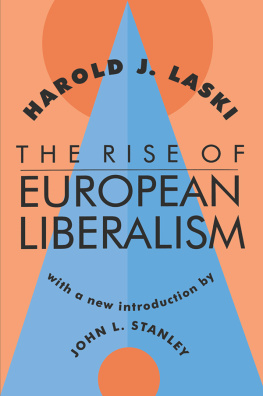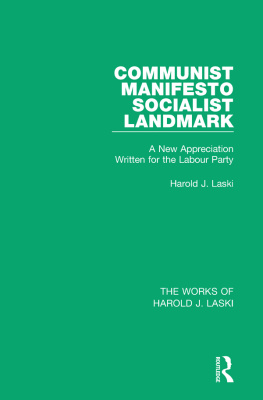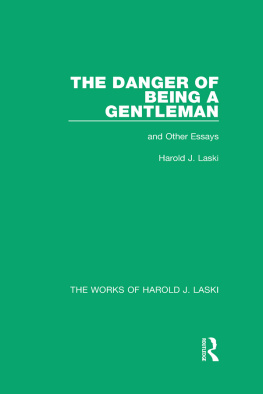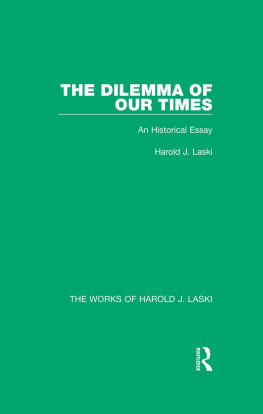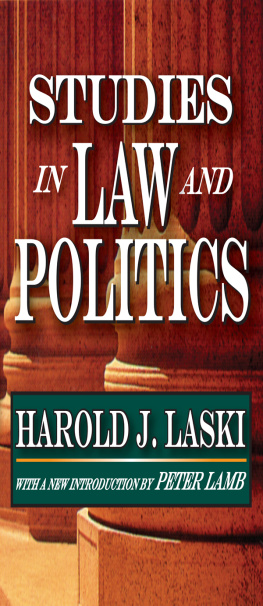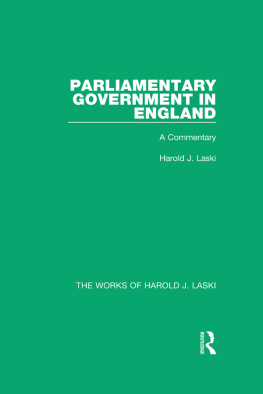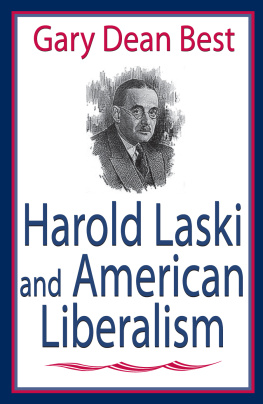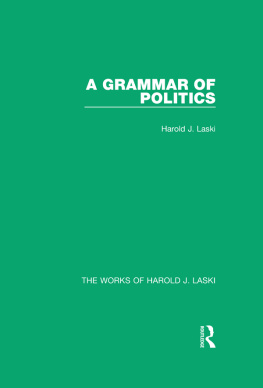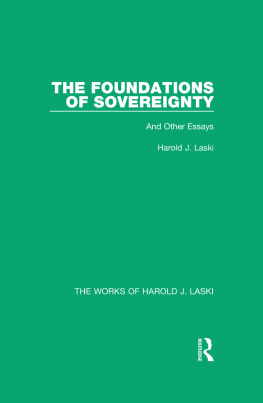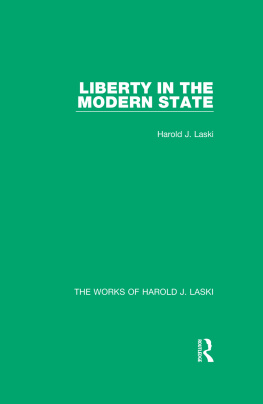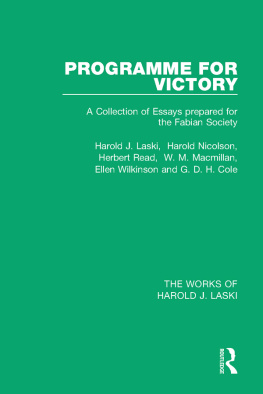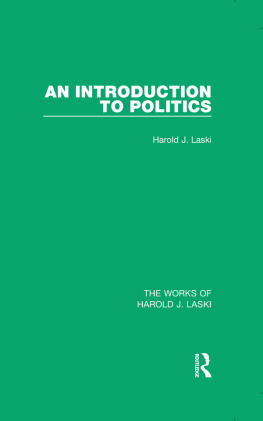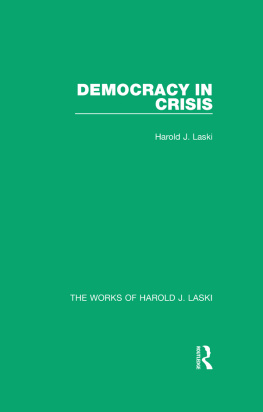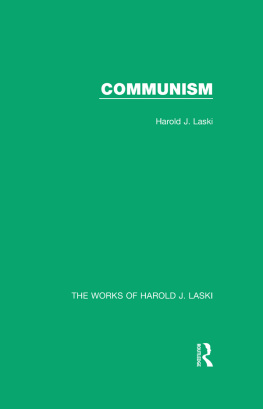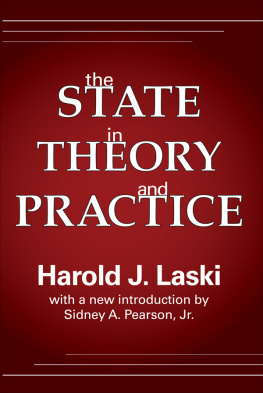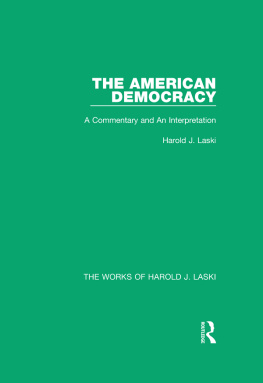Originally published in 1936 by George Allen & Unwin Ltd.
Published 1997 by Transaction Publishers
Published 2017 by Routledge
2 Park Square, Milton Park, Abingdon, Oxon 0X14 4RN
711 Third Avenue, New York, NY 10017, USA
Routledge is an imprint of the Taylor & Francis Group, an informa business
New material this edition copyright 1997 by Taylor & Francis
All rights reserved. No part of this book may be reprinted or reproduced or utilised in any form or by any electronic, mechanical, or other means, now known or hereafter invented, including photocopying and recording, or in any information storage or retrieval system, without permission in writing from the publishers.
Notice:
Product or corporate names may be trademarks or registered trademarks, and are used only for identification and explanation without intent to infringe.
Library of Congress Catalog Number: 96-20337
Library of Congress Cataloging-in-Publication Data
Laski, Harold Joseph, 1893-1950.
The rise of European liberalism / Harold J. Laski ; with a new introduction by John L. Stanley.
p. cm.
Originally published: London : George Allen & Unwin, 1936.
Includes bibliographical references and index.
ISBN 1-56000-845-8 (pbk. : alk. paper)
1. LiberalismEurope, WesternHistory. I. Title.
JC574.2.E85L37 1996
320.51094dc2096-20337
CIP
ISBN 13: 978-1-56000-845-3 (pbk)
PERHAPS the most remarkable aspect of the career and writings of Harold Laski is that while there are at least fourteen books devoted to his life and thought, practically none of Laskis own vast work remains in print today. Even this book, Laskis exciting and provocative account of the rise of liberalism and one of the few of his works to be found in recommended readings in political theory, has for the last generation been found mainly in university libraries.
Laskis decline in popularity can be explained by his persistent left-wing positions in a postwar society whose political moderation and conservatism contrasts markedly with the radical times in which this book was written; and even the radicals of the 1960s were contemptuous of the historical perspective on which Laskis own work rests. Indeed as an exponent of the historical method in political theory, Laskis fame is both derived from and is victimized by the truths which that method illuminates.
Laskis brilliant first work depicted the anti-statism in Victorian religious thought as if these ideas were of lasting relevance. Yet as Laski became increasingly attracted to Marxist methods, he became all the more strongly convinced that this same historical method demonstrates that political ideas, including anti-statism, cannot transcend the circumstances that give birth to them. When Laskis scholarship became tied to his own increasingly statist political program, he at first became immensely popular at a time in which statist ideas were the order of the day. With the decline of their popularity, the more his later efforts became as dated as his political agenda. At certain crucial moments, he overlooked both the possibility of a trans-historical anti-centralism as well as the truths of his own historicism applied to his own ideas.
Yet, at other moments, despite his growing conviction that ideas vanish with their times, Laski remained haunted by remnants of his former viewpoint that ideas can endure beyond their times. Nowhere is that tension between temporality and permanence better shown than in the present work. We see depicted here some of the principles of liberal thought that are still very much with us and with which Laski was always in great sympathy. But this depiction is made against a backdrop of a Marxist methodology that regards liberalism as being tied to bourgeois class structures that are destined to disappear. Indeed, the very tension between Laskis recognition of the lasting testament of liberalism and his Marxist historicism which predicted liberalisms disappearance lends this book its drama. Furthermore, and somewhat ironically, even Laskis historical perspective strengthened the historical tradition in political thought which is regnant today.
Laskis life-long commitment to certain liberal principles is seen in the many accounts of his colorful career, most recently depicted with great brilliance by Isaac Kramnick and Barry Sheerman. Yet soon after his untimely death in 1950 at the age of 57 most of his political writings fell into oblivion.
Born in June 1893 to a politically influential Jewish family in Manchester, the frail, often bed-ridden boy found refuge in books. Yet since his father, Nathan Laski, the untitled king of Manchester Jewry, was heavily involved in Liberal politics, the young Laski was exposed to political life at an early age. One of his earliest memories was of the young, then-liberal Winston Churchill practicing speeches in front of a bedroom mirror in his fathers house. At Oxford, what Kramnick and Sheerman call Laskis combative and self-confident personality allowed this grammar school outsider to shine in Oxford Union debates.
But even his success at persuasion didnt prevent Laski from being attracted to less verbal politics. Not only was he drawn to feminism, with which he had become closely identified in Union debates, but to syndicalism and its concept of direct action. Indeed, he remained sympathetic to the anti-statist position of the syndicalists until 1920. After graduation from Oxford in 1914, Laski went to work as an anti-war editorialist for the Daily Herald. Even so, he tried to enlist in the army, but was rejected for his weak heart. He may have predicted this rejection because of his own frail health, for it seems that there was little feeling of guilt when he and his wife Frida, whom he had married in 1911, sailed for Montreal to take up a position as lecturer in history at McGill University.
It was at McGill that Laski met Felix Frankfurter, who was to remain a life-long friend even after Laskis turn to Marxism in the 1930s. It was through the Frankfurter connection that Laski was able to move to Harvard. There he dazzled students and colleagues and began to build an extensive network of admirers among some of the luminaries of the newly emerging American political establishment, including Pound, Brandis, and Herbert Croly, the editor of the New Republic, with which Laski became closely involved. Later he would befriend Franklin and Eleanor Roosevelt, Edward R. Murrow, and Max Lemer among many others. Then of course there was Oliver Wendell Holmes, whose correspondence with Laski has proven to be among the most enduring of Laskis works.
Despite his friendship with the statist Croly, the young Harvard instructor was still an anti-centralist, and these views were reflected in his first books, Studies in the Problem, of Sovereignly and Authority in the Modem State, published by Yale University Press in 1917 and 1919. Conceived as a part of a larger theory of the state, the first of these works focussed on the anti-statist component of Victorian religious controversies while the second was a study of the political theory of the Catholic reaction in France. Both had as their stated purpose to demonstrate that the idea of absolute sovereignty is a myth, because virtually all social orders which feign unity must rely on the consent of a plurality of men. The ideologues of the state (by which Laski means central political authority), whether ancient, medieval or modern, have failed to realize that there is no epoch in social history where organized resistance to state-decision has not its root in some deep grievance honestly conceived. It was so in 1381... and in 1789.


